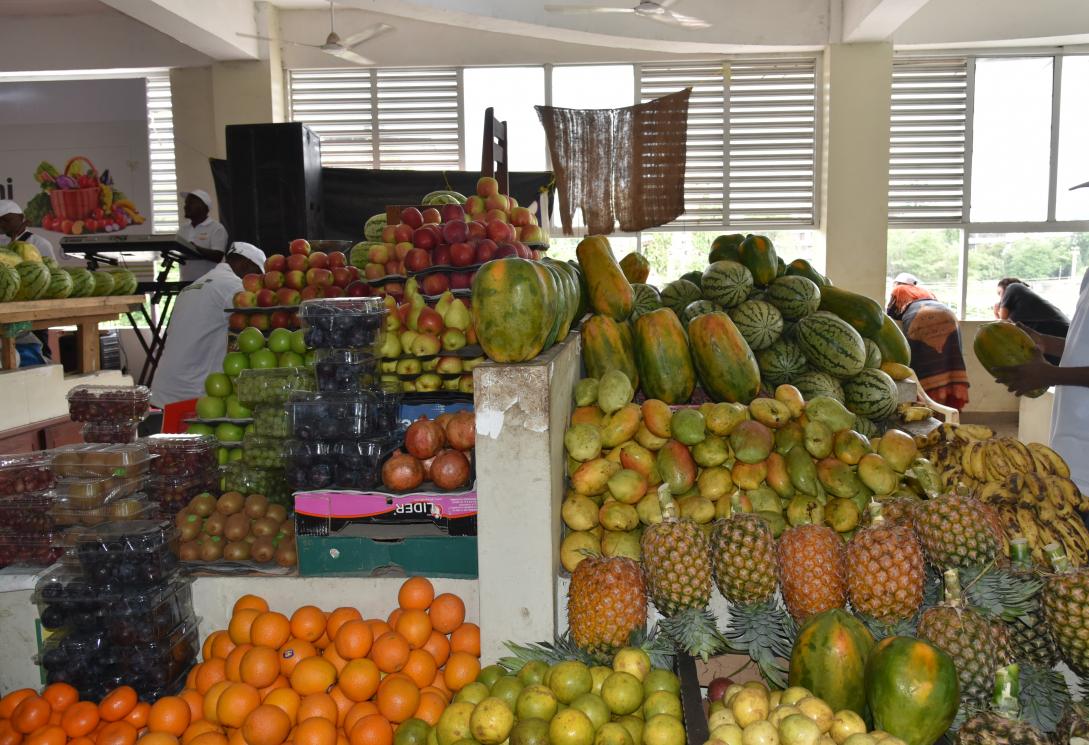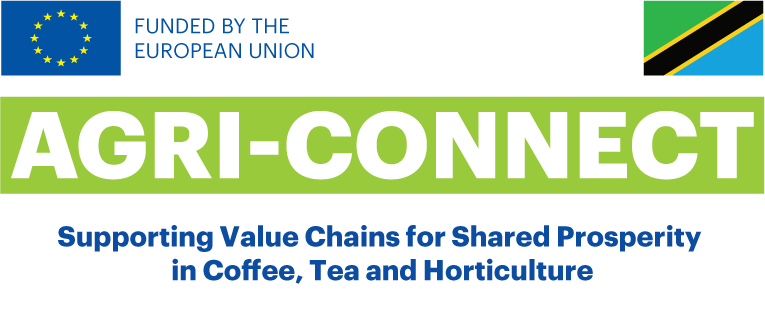
The Revolutionary Government of Zanzibar, the European Union and FAO lead the way in fighting malnutrition in the Spice Island.
The Government’s priority is to eradicate malnutrition and reduce morbidity in the population
29 May 2022, Zanzibar – Following the successful launch of the national nutrition campaign in Mainland Tanzania, the Food and Agriculture Organization of the United Nations (FAO) and the Revolutionary Government of Zanzibar, through the European Union (EU) funded AGRI-CONNECT flagship programme, have launched a national nutrition campaign to promote healthy eating habits in Zanzibar based on locally available food.
Following the successful launch of the national nutrition campaign in Mainland Tanzania, the Food and Agriculture Organization of the United Nations (FAO) and the Revolutionary Government of Zanzibar, through the European Union (EU) funded AGRI-CONNECT flagship programme, have launched a national nutrition campaign to promote healthy eating habits in Zanzibar based on locally available food.
The event was graced by Hon. Shamata Shaame Khamis, Minister of Agriculture, Irrigation, Natural Resources and Livestock, Mr. Cédric Merel, Head of Cooperation at the European Delegation in Tanzania, Dr. Nyabenyi Tipo, FAO Representative in Tanzania, and Ms. Upendo Mwalongo, Nutrition Champion for healthy diet campaign and was attended by a diverse group of experts and stakeholders at Forodhani Gardens in Stone town, Zanzibar. The first 100 people to arrive were given a free plate with a variety of food ingredients from the healthy plate model.
“Agriculture and Nutrition are two faces of the same coin. We now talk about food systems, as we finally realised that Agriculture is not only about economic opportunities but also about improving the health of our people,” said Mr. Cédric Merel, Head of Cooperation at the European Union Delegation in Tanzania. “This joint initiative between the Government, FAO and the EU aims at making the food system in Zanzibar and Tanzania more resilient to any shocks and raise awareness of the population on the close link between what we grow, how we grow it and what we eat.” he said.
Dr. Nyabenyi Tipo, FAO Representative in Tanzania emphasized that: “We recognize that malnutrition is one of the most serious threats to social and economic growth. It reduces children’s ability to survive, grow, thrive, learn and become productive adults, as well as their ability to contribute to the economy. Food habits and practices have an impact on food security, nutrition and general wellbeing”. She went on to say that, “changes in social norms related to food production, consumption, and marketing coverage will increase food security, strengthen the immune system, and provide income to smallholder farmers.”
With its Lishe Bora ni Mtaji (Good Nutrition is an Investment) slogan, the national nutrition campaign will include activities such as cooking programs, dala dala (minibus) nutrition education tours, trainings for female youth, and the establishment of msosi asilia (traditional food sites). Over the course of two years, it is expected to reach 32 million people via traditional and social media platforms.
The Lishe Bora ni Mtaji Campaign will support health, social and economic benefits of addressing malnutrition in all its forms beginning early in life, particularly during the first 1,000 days.
The FAO-led programme titled “Building Resilience of Agri-Food Systems and Better Nutrition in the Context of the Global Pandemic” is the fourth component of the “AGRI-CONNECT- Supporting Value Chains for Shared Prosperity” programme, which focuses mainly on nutrition and establishing systems to help absorb pandemic-like shocks to food and market accessibility.
“The priority of the Revolutionary Government of Zanzibar is to reduce all forms of malnutrition as well as systemic diseases and this campaign has come at a time when the world is struggling to end the COVID-19 epidemic,” said Hon. Shamata Shaame Khamis, Minister of Agriculture, Irrigation, Natural Resources and Livestock. “We have strengthened our nutrition leadership by encouraging more investment in agriculture, food production, and nutrition education to increase the availability and accessibility of healthy diets through improved agricultural productivity and a better understanding of the importance of healthy diets in preventing nutritional disorders and improving body immunity,” he said.
Lishe Bora ni Mtaji
Background:
The European Union, through the 11th European Development Fund (EDF) National Indicative Programme (NIP 2014-2020), has committed EUR 547 million to support three main sectors: good governance and development, energy and sustainable agriculture.
For agriculture, EU has allocated a total amount of EUR 130 million to improve the sustainability of and increase the wealth created by the agriculture sector and reduce vulnerability in the context of a changing climate. This is in line with priorities under national and sector development plans and will strengthen EU-Tanzania cooperation in the agriculture sector.
The objectives pursued through the EU funded programmes are:
- to generate agricultural wealth, through linking farmers to markets and value chains;
- to improve food and nutrition security, through improved access, availability, and use of food.
- to enhance management of natural resources, including forests and eco-system services for sustainable agriculture development and climate change adaptation.
About Agri-Connect
AGRI-CONNECT is a 100 M EURO programme focused on the development of horticulture, coffee and tea value chains. In line with the EU “Farm to Fork” strategy, the programme adopts a holistic approach, starting from improved production in the farms up to the final products reaching the market and the consumers, while taking care of the health aspects as well as the need to protect the environment.
By supporting horticulture, coffee and tea, the EU ultimately aims at improving smallholder’s income and nutrition by contributing to increased productivity, sustainable production, post-harvest management, value addition, and improved market linkages.
To facilitate access to markets and reduce post-harvest losses, 46 percent of the AGRI-CONNECT budget has been allocated to upgrade the network of rural roads in the targeted districts.
AGRI-CONNECT creates opportunities for increased export volumes and revenues, including from premium markets, as well as on- and off-farm entrepreneurship, which creates jobs and benefits, particularly for women and youth.
AGRI-CONNECT also addresses the business environment, as outlined in Agriculture Sector Development Plan (Phase II, 2018-2028) and the Blueprint for Regulatory Reforms to Improve the Business Environment, both of which were launched in May 2018 by the Ministry of Industry and Trade. The program includes support to private-sector investments, which is critical throughout the value chain.
Finally, the programme will support the development of a national awareness campaign to foster behavioural change for improved nutrition, in line with the Government’s 2016 Food and Nutrition Policy and contributing to the objectives of the National Multi-sectoral Nutrition Action Plan (2016–2021).
AGRI-CONNECT is managed by the Ministry of Agriculture in collaboration with the Ministry of Agriculture, Natural Resources, and Livestock in Zanzibar, and its various components are implemented in collaboration with and through the support of a team of technical assistants, Civil Society Organisations, Private Sector Companies, and Government institutions such as the Prime Minister’s Office, Ministry of Industry and Trade, Regional Administration and Local Government (PO-RALG), Ministry of Works and the Tanzania Rural and Urban Roads Agency (TARURA).
A part from AGRI-CONNECT, other agriculture and nutrition programmes funded by EU under the 11th EDF include:
- Support to Food Security and Nutrition in Tanzania (EUR 10 million);
- Beekeeping Value Chain Support (EUR 10 million);
- Strengthening Plant Health Services in Tanzania for Enhanced Food Safety (EUR 10 million)
#EUinTZ, #PamojaTunaweza, #EUGreenDeal, #AGRICONNECT, #euintheworld, #SDGs
About the Food and Agriculture Organization of the United Nations (FAO)
The Food and Agriculture Organization of the United Nations (FAO) is a UN specialized agency that leads international efforts to end hunger by supporting governments in transforming agri-food systems for Better Production, Better Nutrition, a Better Environment, and a Better Life – leaving no one behind. FAO works in over 130 countries around the world. We believe that everyone can help to end hunger. Visit: www.fao.org
This press release is republished from an official website of the European Union. Read the original press release.

